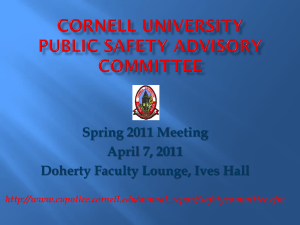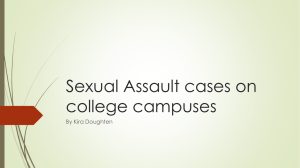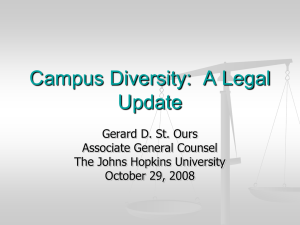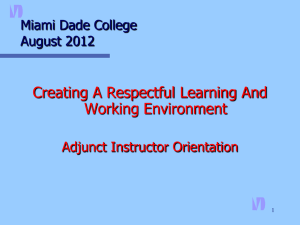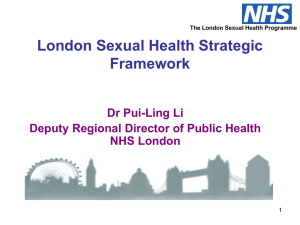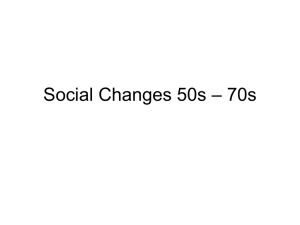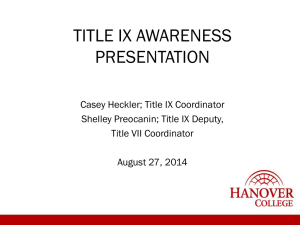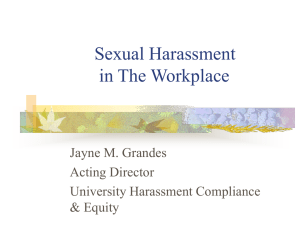Institutional Diversity Plan to Address Gender Diversity
advertisement
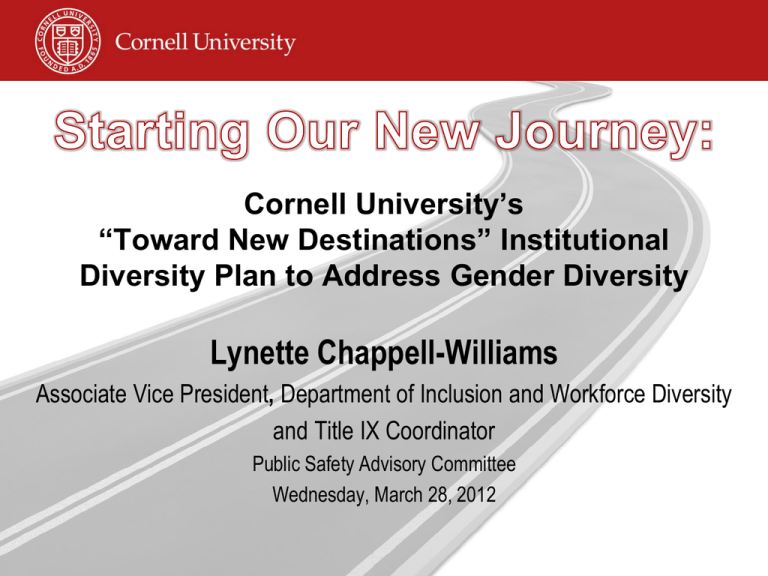
Cornell University’s “Toward New Destinations” Institutional Diversity Plan to Address Gender Diversity Lynette Chappell-Williams Associate Vice President, Department of Inclusion and Workforce Diversity and Title IX Coordinator Public Safety Advisory Committee Wednesday, March 28, 2012 The University Diversity Institutional Planning Framework Four Core Diversity Principles • Composition refers to the demographic make-up of the unit or institution; • Engagement reflects personal, social, and professional commitment to institutional goals and activities; • Inclusion comprises climate and interpersonal relations; and • Achievement reflects levels of attainment for underrepresented individuals or groups compared to broader population. Toward New Destinations Constituent Groups Undergraduate students Tenured/tenure track faculty Graduate and professional students Post-docs and academic professionals* Administration and staff Off-campus constituents - vendors/ businesses and local community organizations, and institutions Cornell’s extended community - parents, alumni, donors, and friends of Cornell * Those with terminal degrees who have responsibilities in research, teaching, or the libraries, but are not included in the tenure-track ranks • Accountability: compliance with Title IX, including 2001 DOE OCR guidance and 2011 “Dear Colleague Letter”; • Composition: gender composition of the college, school or unit; • Engagement: personal, social, and professional commitment of female students/faculty/staff to institutional goals/activities, including commitment to address gender minorities and career/life strategies; • Inclusion: climate and interpersonal relations from gender perspective; • Achievement: levels of attainment for female students, faculty and staff • Athletics: gender equity in athletics, including consideration of the NCAA transgender athlete policy. Cornell’s Title IX Goals Implement and communicate university’s compliant system for addressing sexual harassment and sexual assault/violence matters The judicial administrator and the director of Workforce Policy and Labor Relations will review the provisions of its Code of Conduct, the sexual assault policy (6.3) and the sexual harassment/discrimination policy and procedure (6.4) to establish effective and equitable systems to address sexual harassment and sexual assault/violence matters and to communicate the complaint systems, broadly, to the university community. 5 Cornell’s Title IX Goals continued Expand effective mechanisms for community members to report sexual harassment and sexual assault with the goal of preventing incidents on campus The program manager for inclusive strategies in the Department of Inclusion and Workforce Diversity, will finalize use of the reporting system and database known as "Maxient" by members of the university community to report incidents of bias, sexual harassment, and sexual assault/violence; develop a team of individuals throughout university who can direct individuals to Maxient or file reports on the behalf of other individuals; communicate use of nosexualharrasment@cornell.edu as additional mechanisms for reporting sexual harassment and assault; align Title IX and bias reporting systems; and implement systems to prevent sexual harassment and sexual assault/violence. Cornell’s Title IX Goals Continued Publish/communicate broadly the policy against sexual discrimination, including sexual harassment and sexual assault The director of Workforce Policy and Labor Relations will incorporate ipolicy (Policy 6.4)against discrimination in all relevant training programs for students, faculty and staff and include information about the policy and the reporting of violations of the policy in departmental meetings, university articles, and provide requested information for a dedicated web page with the goal of preventing sexual harassment and sexual assault. 7 Cornell’s Title IX Goals continued Communicate to the university community the name and contact information of the university Title IX coordinator and deputies On an annual basis, the Department of Inclusion and Workforce Diversity will distribute to the university community, the names of the Title IX coordinator and deputies, as well as mechanisms for reporting sexual harassment and sexual assault/violence. 8 Cornell’s Title IX Goals continued Conduct training of faculty and staff who are likely to witness or receive reports of sexual harassment and assault/violence Organizational Development and Faculty Services will provide training opportunities on the university’s sexual harassment and assault prevention policies, how individuals can support individuals in distress and consult with appropriate university officials, how to report activity, the support services available to victims, and information on where individuals need to go to file a complaint. 9 Cornell’s Title IX Goals continued Comply with NCAA Certification Requirements for Gender Equity Consistent with NCAA operating principles, the Athletics Department will implement the written plan for the intercollegiate athletics program so that Cornell University maintains a program, or continues to progress toward a program, that is equitable to both genders. 10 Cornell’s Title IX Goals continued • Increase the communication of the university’s commitment to addressing gender equity • Research unique sexual assault/violence issues facing individuals of color and LGBT members and implement strategy to improve the climate for these individuals 11 Cornell’s Title IX Goals • Expand and increase visibility of “Got Consent” Campaign • Support programs designed to promote safety on campus • Explore creation of Transgender Athlete Policy 12 • Finalize revision of policy/procedure 6.4 compliant with DOE requirements and consistent with Code of Conduct • Finalize and announce gender equity institutional plan • Enhance transparent diversity metrics and create diversity dashboard • Unveil revised University Diversity Web Page • Increase awareness of sexual assault/harassment prevention options and support services 13 • Feature gender equity prominently the university’s diversity initiatives • Establish greater shared accountability for gender equity • Train Title IX Coordinators on Title IX and gender equity 14 • Train those potentially involved in receiving complaints of Title IX allegations. • Provide education and awareness on Title IX, Sexual Harassment, and gender equity to the university workforce • Promote prevention of sexual assault and violence to undergraduate, graduate, and professional students 15 16 17 • Feature gender equity prominently in the university’s diversity initiatives • Establish greater shared accountability for gender equity • Train Title IX Coordinators on Title IX and gender equity 18 19

